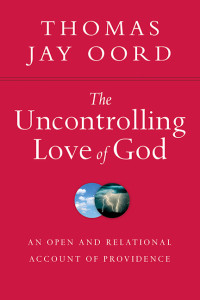Mary Cooperates with Uncontrolling Love
“Be it unto me,” says Mary, the mother of Jesus. She speaks in response to the Spirit’s plans for a special incarnation. And in her consent, Mary becomes a powerful example of what it means to cooperate with God’s uncontrolling love.
Biblical Support for Essential Kenosis
Many people are saying they find attractive the vision of God’s providence I call, “essential kenosis.” This view says God lovingly gives the gifts of freedom, agency, self-organization, being, and law-like regularities to creation. Because God’s nature is first and foremost love that self-gives and other-empowers, God cannot override, withdraw, or fail to provide these gifts to creation.
While many get excited thinking through what essential kenosis entails, a few will say, “But what about those times in the Bible that God does control others entirely?” I typically respond, “I don’t know of any passages. What do you have in mind?”
Some will talk about God’s initial creation of our universe and say “The Bible says God created out of absolutely nothing: creation ex nihilo.” I usually respond by noting that the Bible does not say this. In Genesis 1, the Spirit hovers over the deep when creating. And no passage in the Bible explicitly affirms creation from nothing. (I offer an alternative creation doctrine in a recent Theologies of Creation, recently published by Routledge.)
Others will point to Jesus’ resurrection as an example of God entirely controlling. I reply that the Bible does not say God acted unilaterally to raise Jesus from the dead. We have assumed unilateral determination for resurrection when reading the text. Most biblical miracles explicitly point to creaturely cooperation as essential. None that I know explicitly say miracles occur by God acting alone. Consequently, it seems plausible that Jesus’ body and spirit would cooperate with God’s desire to resurrect. (I address this issue in my book, The Nature of Love)
Be It unto Me
The third example some people will give for God exerting total control is the incarnation of God in Jesus of Nazareth. God must have acted alone to become incarnate in this special way, they say.
But in response, I point out that Mary’s conversation with the angel says otherwise. When the angel announces God’s plans for a Holy Spirit conception, Mary agrees to the plan. “Be it unto me,” she says in approval. The virgin Mary is a paradigm for what it means to cooperate with uncontrolling love.
Mary is a paradigm for what it means to cooperate with uncontrolling love. Share on XTheologians often focus on whether Mary actually engaged in sexual intercourse with a human. Some theologians think the Holy Spirit conception is a historical event. Others say the point theological: Jesus is a special incarnation of God. It doesn’t matter if Mary did or did not engage in sexual intercourse. Besides, ancient people would not have known that Mary’s egg contributes ½ of Jesus’ chromosomes.
Cooperation with God Is Essential
In my new book, The Uncontrolling Love of God, I argue in greater detail what it means to say God is essentially kenotic and expresses uncontrolling love. These ideas are crucial for solving both the problem of evil and the problem of randomness.
Many thoughtful readers discover that creaturely cooperation is also central to essential kenosis. When creatures fail to cooperate or when they cooperate poorly, evil occurs. When creatures cooperate well, God’s reign of love – the kingdom of God – is established. Jesus Christ is our paradigm for what full cooperation with God looks like. But God calls us all, in fact all creation, to respond well to the call to love.
Saying that God’s love is uncontrolling, therefore, is not just the key solving the problem of evil and of randomness. It is also the key to our living life well. We have an essential role to play in God’s providential plans.
As we celebrate the birth of Jesus, I think it appropriate to give Mary a nod of approval and a word of thanks. Her cooperation was essential to God’s incarnation in Jesus of Nazareth. While God gets the glory, Mary deserves our words of appreciation too.
While God gets the glory, Mary deserves words of appreciation too. Share on X
Comments
This is something I have been reflecting on some myself. I really like the idea of paying more attention to Mary and her choice to be the “Theotokos.” A lot of Protestants stop paying attention to her significance because such an inquiry becomes “too Catholic” or that it just doesn’t have much theological weight as does the words and works of Jesus. In her youth, the church had to make sense of such a powerful narrative in order to understand Jesus’ question: But, who do you say that I am? A question we must still ask today as the church present. In the Advent season, our longing for Christ’s return is significant in many ways, of course, but I think an important analogy to reflect upon for the season is Mary’s birth of Jesus as a way of understanding the example Christ gifted to humanity in order to properly cooperate in God’s restoration of Creation. With Christmas, we celebrate the exordium of our Savior’s incarnation . Where it was made possible to be like God while dwelling in the flesh, “on earth as it is in heaven.” “Be it unto me” is the passivity of allowing through intentional choice the Spirit to dwell in us, the church, as we participate and usher in the birth of the kingdom of God. And so, like Christ we essentially offer both our bodies and souls for those who need God’s presence and healing most. In a short word, this post was well received, a cause for reflecting on the season in certain ways, and an excellent reminder of the importance of Saint Mary. This coming from a grateful and former (yet, still current) student.